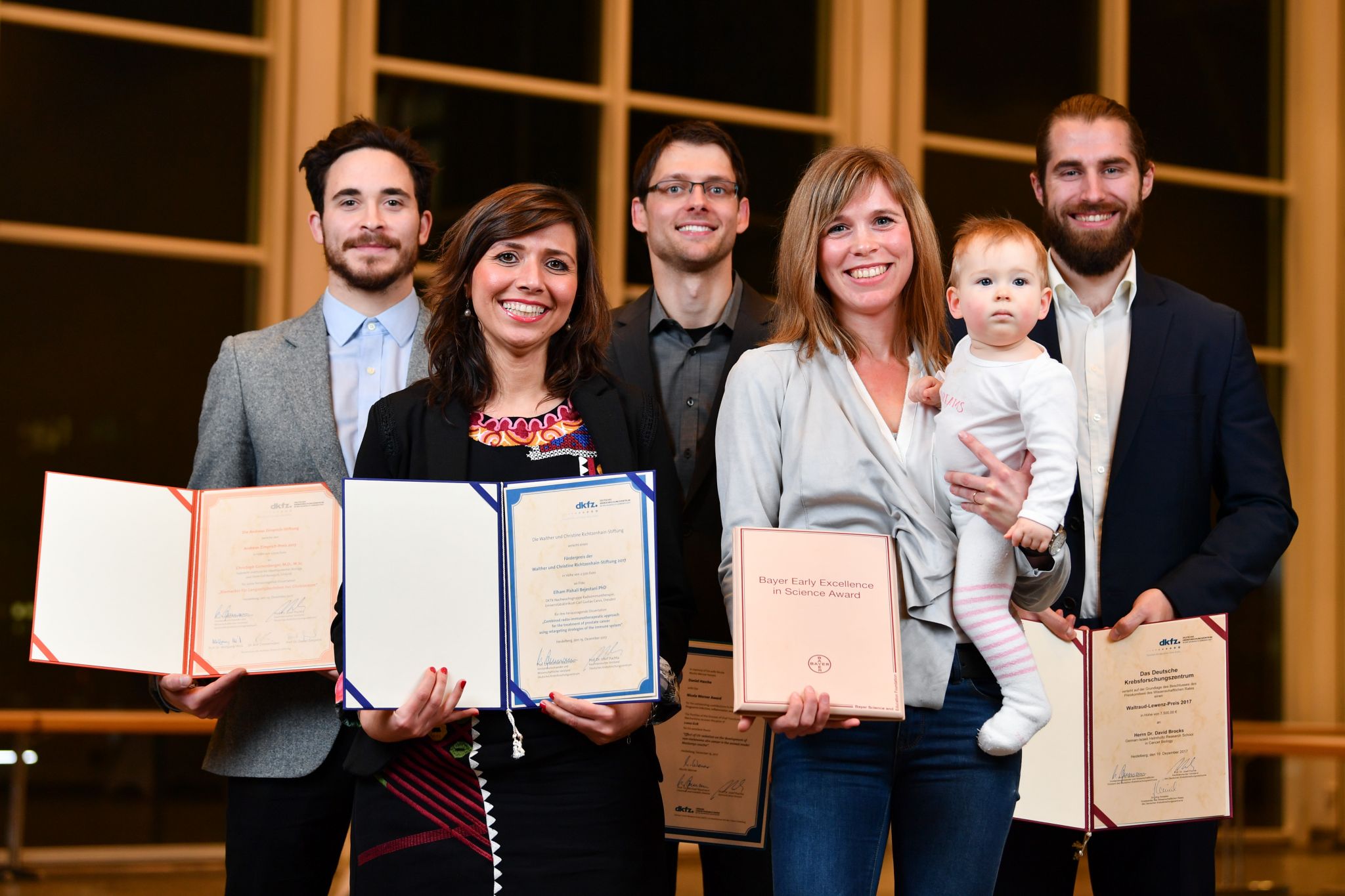20/12/2017
Print PageA shower of awards at the DKFZ: DKTK scientists receive Richtzenhain price
The Richtzenhain Award, which this year is awarded for doctoral theses, is shared in equal halves of €2,500 by two award winners from the German Cancer Consortium (DKTK):
Susan Kläger, who currently works at the Broad Institute of MIT and Harvard in the USA, is being honored for her research at the DKTK partner site at Munich Technical University. In her PhD thesis, she was able to show that a group of targeted anticancer drugs called kinase inhibitors have a considerably broader spectrum of activity than originally expected.
Elham Pishali undertook her award-winning PhD thesis at the DKTK partner site at Dresden Technical University where she examined how T cells can be directed specifically against prostate cancer cells with the goal of developing a combined radio-immunotherapy against the disease.
The award goes back to physicians Walther and Christine Richtzenhain, a married couple from Darmstadt, Germany. Several years before her own death in 1975, Christine Richtzenhain had founded the Walther and Christine Richtzenhain Award to commemorate her husband Walther, who had died from pancreatic cancer. Richtzenhain was a neurologist and psychiatrist who had also studied theology. He was actively involved in the German Peace Society (DFG). One of the very first winners of the Richtzenhain Award in 1971 was Harald zur Hausen, who later became a Nobel Prize winner and was DKFZ Chairman of the Board for many years.
The 2017 Waltraud Lewenz Award, which carries a monetary prize of €7,500, goes to David Brocks from the Epigenomics and Cancer Risk Factors Division. Brocks discovered that specific drugs that are intended to erase epigenetic alterations in tumor cells also promote the production of multiple mysterious gene transcripts. This extraordinary gene activity has the potential to stimulate the immune system – a previously unnoticed effect that can enhance the effect of the therapeutic agents.
The Waltraud Lewenz Award is named after its founder, a school teacher from Wiesbaden, Germany, who died from cancer in 1999 at the age of 58. The award is part of her bequest and is awarded biannually for outstanding research at DKFZ in the areas of “Cancer Risk Factors and Prevention” and “Diagnostics and Experimental Therapy”.
This year’s Andreas Zimprich Award, which is accompanied by a monetary prize of €2,500, will be given to Christoph Geisenberger, who currently pursues research at the Hubrecht Institute for Developmental Biology and Stem Cell Research in Utrecht, Netherlands. He receives the award for his research on biomarkers that are associated with long-term survival in glioblastoma. He undertook this research at the Neurosurgery Department of Heidelberg University Hospital.
The award goes back to the Zimprich family from Heilbronn, Germany, whose son Andreas died from brain cancer a couple of years ago. The family decided at the time to support research in the area of neuro-oncology. Jointly with the DKFZ, they established the Andreas Zimprich Foundation, which has awarded the Andreas Zimprich Award for an outstanding medical doctoral thesis in neuro-oncology since 2015.
The 2017 Nicola Werner Research Award for young scientists is given to Daniel Hasche from the DKFZ Division of Viral Transformation Mechanisms. The young virus researcher has recently been the first to prove experimentally that specific types of human papillomavirus are also responsible for the development of non-melanoma skin cancer.
The €2,000 Nicola Werner Award is named after an artist who died from an HPV induced tumor. She was committed to supporting research on HPV and to making prevention possibilities such as HPV vaccination more widely known. The award is a distinction intended for young scientists at DKFZ with an outstanding doctoral thesis or publication in the area of HPV research.
This year’s Bayer Early Excellence in Science Award, which carries a monetary prize of €10,000 and thus has the highest budget of the awards presented that day, is given to Theresa Bunse for her research at the Clinical Cooperation Unit “Neuroimmunology”. With this award, the Bayer Foundation aims to support creative young researchers at early stages in their career.
Theresa Bunse had developed a vaccine that causes a highly specific immune response against a characteristically altered protein in many tumors. The vaccine was capable of stopping tumor growth in mice and is already being examined for safety in a phase I clinical trial.
Jointly with the award winners, the Scientific Council of the DKFZ on that day celebrates its exact 40th anniversary of commitment to research matters at the Center.
